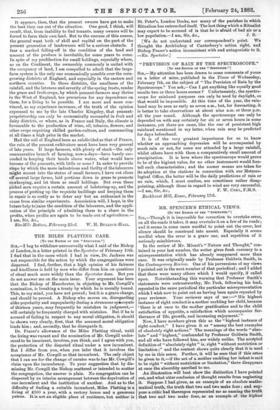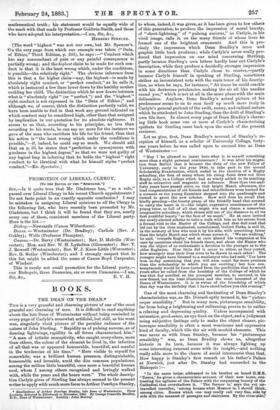MR. SPENCER'S ETHICAL VIEWS.
[To THE EDITOR OP THE 4. sinscrAToR."1 Sra,—Though it is impossible for correction to overtake error, on all the roads it takes, it may overtake it on a few of its roads-; and it seems in some cases needful to point out the error, lest silence should be construed into assent. Especially it seems needful when the error is a grave one, and repetition of it seriously mischievous.
In the review of Mr. Mivart's "Nature and Thought," con- tained in your last number, the writer gives fresh currency to a misrepresentation which has already reappeared more than once. It was originally made by Professor Goldwin Smith, in the Contemporary Review. One of his perversions of my views I pointed out in the next number of that periodical ; and I added. that there were many others which I would specify, if called upon. Notwithstanding this warning that Professor Smith's statements were untrustworthy; Mr. Peek, following his lead, repeated in the same periodical the particular misrepresentation which I wish now to point out as having been again repeated by your reviewer. Your reviewer says of me :—" His highest instance of right conduct is a mother suckling her child, because there is at once to the mother gratification and to the child satisfaction of appetite, a satisfaction which accompanies fur- therance of life, growth, and increasing enjoyment'" Now, I have nowhere given this as the "highest instance of right conduct." I have given it as " among the best examples of absolutely right actions." The meanings of the words "abso- lute " and " highest," confounded by Professor Goldwin Smith, and all who have followed him, are widely unlike. The accepted definition of " absolutely right " is, right " without restriction or limitation ;" and the context shows quite clearly that it is used by me in this sense. Further, it will be seen that if this sense be given to it,—if the act of a mother suckling her infant is said to be right " without restriction or limitation," there disappears at once the absurdity ascribed to me.
An illustration will best show the distinction I have pointed. out, and what utter confusion of thought results from neglecting it. Suppose I had given, as an example of an absolute mathe- matical truth, the truth that two and two make four; and sup- pose a critic had thereupon represented me as naming the truth that two and two make four, as an example of the highest
mathematical truth ; his statement would be equally wide of the mark with that made by Professor Goldwin Smith, and those who have adopted his interpretation.—I am, Sir, &c., HERBERT SPENCER.
IThe word " highest " was not our own, but Mr. Spencer's. O a the very page from which our example was taken (" Data, of Ethics," Third Edition, p. 261), he says :—" Conduct which has any concomitant of pain or any painful consequence is partially wrong ; and the highest claim to be made for such con- duct is that it is the least wrong which, under the conditions, ie possible—the relatively right." The obvious inference from this is that a far higher claim—nay, the highest—is made by absolutely right conduct, or "perfect conduct," as he calls it, which is instanced a few lines lower down by the healthy mother suckling her child. The distinction which he now draws between what is "absolutely right" (or "perfect ") and the " highest " right conduct is not expressed in the "Data of Ethics ;" and although we, of course, think the distinction perfectly valid, we have been unable to find in that work any ground indicated on which conduct may be considered high, other than that assigned by implication in our quotation for its absolute rightness. It seems to us that, according to his principles, no less than according to his words, he can say no more for the instance we gave of the man who sacrifices his life for his friend, than that his action is "the least wrong which under the conditions is possible,"—if, indeed, he could say so much. We should add that on p. 33, he states that "perfection is synonymous with goodness in the highest degree," so that we were not guilty of any logical leap in inferring that he holds the " highest " right conduct to be identical with what he himself styles " perfect conduct."—En. Spectator.]



































 Previous page
Previous page